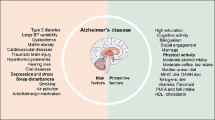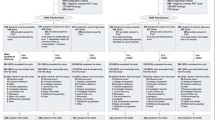Abstract
Although it is well recognized that MCI represents a risk state for subsequent dementia, estimates of conversion vary widely according to the diagnostic criteria employed. There are currently no simple cognitive predictors of high and low risk of progression. We followed 107 non-demented non-depressed subjects from an original cohort of 124—sub-classified as follows: pure amnestic MCI (22), multi-domain MCI (54), non-amnestic MCI (10) and worried well (21). At 2 years, outcome varied considerably. Of the multi-domain MCI group 59% progressed to dementia and only 5% improved. By contrast, in pure amnestic MCI only 18% progressed and 41% improved. Of non-amnestic MCI patients 70% improved. The best predictor of progression was a combination of the Addenbrooke’s cognitive examination (ACE) and the paired associate learning task (PAL), which produced high negative predictive (90%) and sensitivity (94%) values. The results indicate very different outcomes according to whether patients have pure amnestic versus multi-domain MCI. While the latter is an aggressive disorder, the former is more benign and unstable even in a clinic setting. Patients with scores >88 on the ACE and/or <14 errors on the PAL can be confidently reassured of a good prognosis.


Similar content being viewed by others
References
Albert MS, Moss MB, Tanzi R, Jones K (2001) Preclinical prediction of AD using neuropsychological tests. J Int Neuropsychol Soc 7:631–639
Alladi S, Arnold R, Mitchell J, Nestor PJ, Hodges JR (2006) Mild cognitive impairment: applicability of research criteria in a memory clinic and characterisation of cognitive profile. Psychol Med 36:507–515
Bak TH, Rogers TT, Crawford LM, Hearn VC, Mathuranath PS, Hodges JR (2005) Cognitive bedside assessment in atypical parkinsonian syndromes. J Neurol Neurosurg Psychiatry 76:420–422
Blackwell AD, Sahakian BJ, Vesey R, Semple JM, Robbins TW, Hodges JR (2004) Detecting dementia: novel neuropsychological markers of pre-clinical Alzheimer’s disease. Dement Geriatr Cogn Disord 17:42–48
Bowen J, Teri L, Kukull W, McCormick W, McCurry SM, Larson EB (1997) Progression to dementia in patients with isolated memory loss. Lancet 349:763–765
Bozoki A, Giordani B, Heidebrink JL, Berent S, Foster NL (2001) Mild cognitive impairments predict dementia in nondemented elderly patients with memory loss. Arch Neurol 58:411–416
Brys M, Pirraglia E, Rich K, Rolstad S, Mosconi L, Switalski R, Glodzik-Sobanska L, De Santi S, Zinkowski R, Mehta P, Pratico D, Saint Louis LA, Wallin A, Blennow K, de Leon MJ (2009) Prediction and longitudinal study of CSF biomarkers in mild cognitive impairment. Neurobiol Aging 30(5):682–690
Collie A, Maruff P (2000) The neuropsychology of preclinical Alzheimer’s disease and mild cognitive impairment. Neurosci Biobehav Rev 24(3):365–374
De Jager CA, Hogervorst E, Combrinck M, Budge MM (2003) Sensitivity and specificity of neuropsychological tests for mild cognitive impairment, vascular cognitive impairment and Alzheimer’s disease. Psychol Med 33:1039–1050
de Leon MJ, Mosconi L, Blennow K, DeSanti S, Zinkowski R, Mehta PD, Pratico D, Tsui W, Saint Louis LA, Sobanska L, Brys M, Li Y, Rich K, Rinne J, Rusinek H (2007) Imaging and CSF studies in the preclinical diagnosis of Alzheimer’s disease. Ann N Y Acad Sci 1097:114–145
Devanand DP, Folz M, Gorlyn M, Moeller JR, Stern Y (1997) Questionable dementia: clinical course and predictors of outcome. J Am Geriatr Soc 45:321–328
Dudas RB, Berrios GE, Hodges JR (2005) The Addenbrooke’s cognitive examination (ACE) in the differential diagnosis of early organic dementias from affective disorder. Am J Geriatr Psychiatry 13:218–226
Fischer PJS, Zehetmayer S, Weissgram S, Hoenigschnabl S, Gelpi E, Krampla W, Tragl KH (2007) Conversion from subtypes of mild cognitive impairment to Alzheimer dementia. Neurology 68:288–291
Flicker C, Ferris SH, Reisberg B (1991) Mild cognitive impairment in the elderly: predictors of dementia. Neurology 41:1006–1009
Folstein MF, Folstein SE, McHugh PR (1975) “Mini-mental state”. A practical method for grading the cognitive state of patients for the clinician. J Psychiatr Res 12:189–198
Galton CJ, Erzinclioglu S, Sahakian BJ, Antoun N, Hodges JR (2005) A comparison of the Addenbrooke’s cognitive examination (ACE) conventional neuropsychological assessment and simple MRI-based medial temporal lobe evaluation in the early diagnosis of Alzheimer’s disease. Cogn Behav Neurol 18(3):144–150
Geslani DM, Tierney MC, Herrmann N, Szalai JP (2005) Mild cognitive impairment: an operational definition and its conversion rate to Alzheimer’s disease. Dement Geriatr Cogn Disord 19:383–389
Griffith HR, Martin RC, Bambara JK, Marson DC, Faught E (2006) Older adults with epilepsy demonstrate cognitive impairments compared with patients with amnestic mild cognitive impairment. Epilepsy Behav 8:161–168
Grundman M, Petersen RC, Ferris SH, Thomas RG, Aisen PS, Bennett DA, Foster NL, Jack CRJ, Galasko DR, Doody RS, Kaye J, Sano M, Mohs R, Gauthier S, Kim HT, Jin S, Schultz AN, Schafer K, Mulnard R, van Dyck CH, Mintzer J, Zamrini EY, Cahn-Weiner D, Thal LJ (2004) Mild cognitive impairment can be distinguished from Alzheimer disease and normal aging for clinical trials. Arch Neurol 61:59–66
Hodges JR, Erzinclioglu S, Patterson K (2006) Evolution of cognitive deficits and conversion to dementia in patients with mild cognitive impairment: a very long-term follow-up study. Dement Geriatr Cogn Disord 21:380–391
Lehrner J, Gufler R, Guttmann G, Maly J, Gleiss A, Auff E, Dal-Bianco P (2005) Annual conversion to alzheimer disease among patients with memory complaints attending an outpatient memory clinic: the influence of amnestic mild cognitive impairment and the predictive value of neuropsychological testing. Wien Klin Wochenschr 117:629–635
Maioli F, Coveri M, Pagni P, Chiandetti C, Marchetti C, Ciarrocchi R, Ruggero C, Nativio V, Onesti A, D’Anastasio C, Pedone V (2007) Conversion of mild cognitive impairment to dementia in elderly subjects: a preliminary study in a memory and cognitive disorder unit. Arch Gerontol Geriatr 44(Suppl 1):233–241
Marcos A, Gil P, Barabash A, Rodriguez R, Encinas M, Fernandez C, Cabranes JA (2006) Neuropsychological markers of progression from mild cognitive impairment to Alzheimer’s disease. Am J Alzheimers Dis Other Demen 21:189–196
Mathuranath PS, Nestor P, Berrios GE, Rakowicz W, Hodges JR (2000) A brief cognitive test battery to differentiate Alzheimer’s disease and frontotemporal dementia. Neurology 55:1613–1620
McKenna P, Warrington EK (1983) Graded naming test. NFER-Nelson, Windsor
Morris JC (1993) The Clinical Dementia Rating (CDR): current version and scoring rules. Neurology 43:2412–2414
Nestor PJ, Scheltens P, Hodges JR (2004) Advances in the early detection of Alzheimer’s disease. Nat Med 10(Suppl):S34–S41
Perry RJ, Hodges J (2003) Attentional control and the time course of attention in mild cognitive impairment measurement of attentional dwell time. Eur J Neurosci 18:221–226
Perry RJ, Watson P, Hodges JR (2000) The nature and staging of attention dysfunction in early (minimal and mild) Alzheimer’s disease: relationship to episodic and semantic memory impairment. Neuropsychologia 38:252–271
Petersen RC (2004) Mild cognitive impairment as a diagnostic entity. J Intern Med 256:183–194
Petersen RC, Doody R, Kurz A, Mohs RC, Morris JC, Rabins PV, Ritchie K, Rossor M, Thal L, Winblad B (2001) Current concepts in mild cognitive impairment. Arch Neurol 58(12):1985–1992
Petersen RC, Smith GE, Waring SC, Ivnik RJ, Kokmen E, Tangelos EG (1997) Aging, memory, and mild cognitive impairment. Int Psychogeriatr 9(Suppl 1):65–69
Petersen RC, Smith GE, Waring SC, Ivnik RJ, Tangalos EG, Kokmen E (1999) Mild cognitive impairment: clinical characterization and outcome. Arch Neurol 56:303–308
Reitan RM (1985) Halstead-Reitan neuropsychological test battery. Reitan Neuropsychology Laboratory/Press, Tuscon
Rey A (1941) L’examen psychologique dans les cas d’encephalopathie traumatique. Arch Psychol 28:286–340
Rozzini L, Chilovi BV, Conti M, Bertoletti E, Delrio I, Trabucchi M, Padovani A (2007) Conversion of amnestic mild cognitive impairment to dementia of Alzheimer type is independent to memory deterioration. Int J Geriatr Psychiatry 22:1217–1222
Schmidt M (1996) Rey auditory verbal learning test: a handbook. Western Psychological Services, Los Angeles
Snaith RP, Zigmund AS (1994) The hospital anxiety and depression scale. NFER Nelson, Windsor, UK
Swainson R, Hodges JR, Galton CJ, Semple J, Michael A, Dunn BD, Iddon JL, Robbins TW, Sahakian BJ (2001) Early detection and differential diagnosis of Alzheimer’s disease and depression with neuropsychological tasks. Dement Geriatr Cogn Disord 12:265–280
Tabert MH, Manly JJ, Liu X, Pelton GH, Rosenblum S, Jacobs M, Zamora D, Goodkind M, Bell K, Stern Y, Devanand DP (2006) Neuropsychological prediction of conversion to Alzheimer disease in patients with mild cognitive impairment. Arch Gen Psychiatry 63:916–924
Tierney MC, Szalai JP, Snow WG, Fisher RH, Nores A, Nadon G, Dunn E, St George Hyslop PH (1996) Prediction of probable Alzheimer’s disease in memory-impaired patients – a prospective longitudinal study. Neurology 46:661–665
Welsh KA, Butters N, Hughes JP, Mohs RC, Heyman A (1992) Detection and staging of dementia in Alzheimer’s disease: use of the neuropsychological measures developed for the consortium to establish a registry for Alzheimer’s disease. Arch Neurol 49:448–452
Whitwell JL, Jack CR Jr, Baker M, Rademakers R, Adamson J, Boeve BF, Knopman DS, Parisi JF, Petersen RC, Dickson DW, Hutton ML, Josephs KA (2007) Voxel-based morphometry in frontotemporal lobar degeneration with ubiquitin-positive inclusions with and without progranulin mutations. Arch Neurol 64:371–376
Winblad B, Palmer K, Kivipelto M, Jelic V, Fratiglioni L, Wahlund LO, Nordberg A, Backman L, Albert M, Almkvist O, Arai H, Basun H, Blennow K, de Leon M, DeCarli C, Erkinjuntti T, Giacobini E, Graff C, Hardy J, Jack C, Jorm A, Ritchie K, van Duijn C, Visser P, Petersen RC (2004) Mild cognitive impairment – beyond controversies, towards a consensus: report of the International Working Group on Mild Cognitive Impairment. J Intern Med 256:240–246
Acknowledgements
We are grateful to Georgina Morrill and Sarah Homewood for help with preparing the manuscript. This work was supported by a MRC programme grant.
Author information
Authors and Affiliations
Corresponding author
Rights and permissions
About this article
Cite this article
Mitchell, J., Arnold, R., Dawson, K. et al. Outcome in subgroups of mild cognitive impairment (MCI) is highly predictable using a simple algorithm. J Neurol 256, 1500–1509 (2009). https://doi.org/10.1007/s00415-009-5152-0
Received:
Revised:
Accepted:
Published:
Issue Date:
DOI: https://doi.org/10.1007/s00415-009-5152-0




